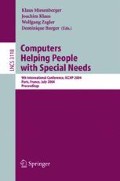Abstract
106 persons with intellectual disabilities were recruited for the evaluation of an information and communication technology (ICT) training programme (77 in the experimental and 29 in the control group). The main features of the programme were a specially designed training curriculum with software designed in appropriate language and appropriate levels for people with intellectual disabilities. In the training programme, participants were taught about the operations of mouse and keyboard and browsing the Internet using Internet Explorer (IE). Participants in the control group underwent equal number of hours of ICT training by the staff working in their centers. All participants were assessed on ICT competence at pre- and post-training and one month follow up using a skill-based checklist. Results from repeated measure ANOVA and t-tests showed that participants acquired a higher level of computer competence after training and retained skills within one-month follow-up period, [F (75) = 70.06, p=.000]. For the control group, there was no statistically significant difference in the score on sub-tasks of use of mouse and keyboard [t(28) = 1.51, p > .05], the sub-task of internet browsing [t(28) = 1.00, p > .05] and the overall score [t(28) = .90, p > .05]. Results indicated that persons with intellectual disabilities have the capacity to learn ICT skills in a structured group with appropriate learning assistance and appropriate training tools.
Access this chapter
Tax calculation will be finalised at checkout
Purchases are for personal use only
Preview
Unable to display preview. Download preview PDF.
References
Borchert, G.D.: The Challenge of Cyberspace: Internet Access and Persons with Disabilities. In: Ebo, B., et al. (eds.) Cyberghetto or cybertopia?: Race, class, and gender on the Internet, pp. 50–63. Praeger Publisher/Greenwood Publishing Group, Inc, Westport (1998)
Siegel, J.: Utilizing Technology for the Inclusion of Individuals with Mental Retardation. In: Retish, P., Reiter, S., et al. (eds.) Adults with Disabilities: International Perspectives in the Community, pp. 287–308. Lawerence Erlbaum Associates, Inc., Mahwah (1999)
Frankin, K.S.: Assistive Technology: Where Are We? Where Are We Going? Journal of Vocational Rehabilitation 1(2), 6–7 (1991)
Bremer, J., Beresin, E.V.: Computers in Psychiatry Today. Academic Psychiatry 24(3), 168–172 (2000)
Shimizu, H., Twyman, J.S., Yamamoto, J.I.: Computer Based Sorting-to- Matching in Identity Matching for Young Children with Developmental Disabilities. Research in Developmental Disabilities 24(3), 183–194 (2003)
Fuller, P.W.: Attention and the EEG Alpha Rhythm in Learning Disabled Children. Journal of Learning Disabilities 11(5), 303–312 (1978)
Huguenin, N.H.: Employing Computer Technology to Assess Visual Attention in Young Children and Adolescents with Severe Mental Retardation. Journal of Experimental Child Psychology 65(2), 141–170 (1997)
Hughson, E.A., Brown, R.I.: Some Effects of Verbal Instructions on Learning by Developmentally Handicapped Adults. Australia and New Zealand Journal of Developmental Disabilities 9(3), 107–115 (1983)
Hartwick, J., Yuen, H.K.: A Compensatory Counting System: Academic Skill Training. American Journal of Occupational Therapy 50(9), 740–746 (1996)
McCarl, J.J., Svobodny, L., Beare, P.L.: Self-recording in a Classroom for Students with Mild to Moderate Mental Handicaps: Effects on Productivity and On-task Behavior. Education and Training in Mental Retardation 26(1), 79–88 (1991)
Davis, D.K., Stock, S.E., Wehmeyer, M.L.: Enhancing Independent Internet Access for Individual with Mental Retardation through Use of a Specialized Web Browser: A Pilot Study. Education and Training in Mental Retardation and Developmental Disabilities 36(1), 107–113 (2001)
Davis, D.K., Stock, S.E., Wehmeyer, M.L.: Enhancing Independent Task Performance for Individuals with Mental Retardation through the Use of a Handheld Self-directed Visual and Audio Prompting System. Education and Training in Mental Retardation and Developmental Disabilities 37(2), 209–218 (2002)
Garcia, E.E., DeHaven, E.D.: Teaching Generalized Speech: Reestablishing a Previously Trained Repertoire of Functional Speech in a Profoundly Retarded Adolescent. Behavior Research of Severe Developmental Disabilities 1(2), 147–160 (1980)
Author information
Authors and Affiliations
Editor information
Editors and Affiliations
Rights and permissions
Copyright information
© 2004 Springer-Verlag Berlin Heidelberg
About this paper
Cite this paper
Li-Tsang, C.W.P., Chan, C.C.H., Lam, C., Hui-Chan, C., Yeung, Ss. (2004). Evaluations of an Information and Communication Technology (ICT) Training Programme for Persons with Intellectual Disabilities. In: Miesenberger, K., Klaus, J., Zagler, W.L., Burger, D. (eds) Computers Helping People with Special Needs. ICCHP 2004. Lecture Notes in Computer Science, vol 3118. Springer, Berlin, Heidelberg. https://doi.org/10.1007/978-3-540-27817-7_152
Download citation
DOI: https://doi.org/10.1007/978-3-540-27817-7_152
Publisher Name: Springer, Berlin, Heidelberg
Print ISBN: 978-3-540-22334-4
Online ISBN: 978-3-540-27817-7
eBook Packages: Springer Book Archive

